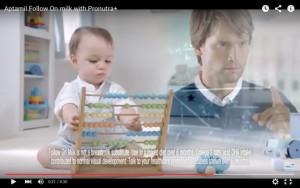CLICK HERE and HERE for media coverage
CLICK HERE for Mike Brady’s Campaign Blog about how you can help stop the misleading adverts and bad marketing
CLICK HERE for MEPs on the ENVI Committee. Please ask as many as possible to support Keith Taylor. Just a short message will do asking them to support Keith Taylor tomorrow.
CLICK HERE and CLICK HERE for responses fromWHO to requests from Keith Taylor
The screenshots above are from a current peak-time television advertisement for Danone’s Aptamil brand in the UK CLICK HERE for YouTube
PRESS RELEASE
Opportunity for European Parliamentarians to protect child health and prevent obesity
11th January 2016
The European Parliament’s Environment, Public Health and Food Safety Committee (ENVI) will, on Thursday 14th January, vote on whether to object to proposals for new laws from the European Commission on the marketing of baby foods and formulas and to strengthen them in line with the World Health Assembly Resolutions. If enough MEPs support the objections, tabled by Green MEP Keith Taylor, the proposals will be voted on by the whole Parliament next week in Strasbourg. [i]
Patti Rundall, OBE, Policy Director of Baby Milk Action –IBFAN UK,[ii] said: “We are delighted that Mr Taylor has taken this strong stand. Poor diet is now the biggest underlying cause of disease and death globally [iii]– bigger than tobacco, alcohol and physical inactivity, and early child feeding plays a big role in building and reinforcing both healthy unhealthy food preferences.[iv] Obesity levels have more than tripled in many European countries since the 1980s and the related diseases are fast consuming health budgets. Parliament now has a golden opportunity to do something significant to address this problem. The only logic in waiting is that it would please the industry.”
In response to a query from Mr Taylor, WHO has explained how the proposed Delegated Acts conflict with and fail to meet WHO’s minimum recommendations, not only in regard to sugar levels but also in relation to their weak marketing controls. WHO explains that WHA Resolutions “clearly cover all products that function as breastmilk substitutes. This should include any milk products (liquid or powdered) marketed for young children up to two years (including follow-up formula and growing-up milks.” Unless changed the Commission’s proposals will continue to be among the weakest in the world.[i] They would allow:
- products to have unacceptably high levels of sugar;
- formulas (including those for vulnerable infants who require specialist feeds) to contain potentially risky ingredients that will not have been independently checked for efficacy and safety;
- follow-on formulas to carry promotional claims;
- follow-on formulas to be advertised in all media. For example, a current Danone TV advertisement in the UK suggests its Aptamil formula, gives babies the strength, balance and stamina to grow up to become ballet dancers and enhances their mental ability to be adept at calculus.
The debate in ENVI in December was evenly divided, with six MEPs speaking in favour of Mr Taylor and six sharing the industry views that EU advertising is ‘already controlled enough.’ Among points raised:
- Inappropriate marketing of baby foods and formulas will still be allowed: In putting forward their arguments, some of the MEPs seemed unaware of the extent of TV and media advertising in the EU, incorrectly claiming that such advertising only occurs in scientific journals that are not read by families. This is totally untrue. There is prolific marketing of infant milks across all media.[vi],[vii]
In addition, soon to be published EU-funded research shows that parents of young children are disproportionately targeted with health claims on products, with over 70% of baby foods and formulas carrying health claims all of which suggest that processed products are better than fresh, healthy sustainable foods.[viii] Unless the rules are changed this will get worse. The Commission is currently considering the approval of 17 new highly promotional claims relating to ‘children’s development and health’ many of which relate to mandatory ingredients that EFSA has stated “can be easily consumed as part of a balanced diet.”
- Concerns about childhood obesity: The Delegated Acts allow baby foods to provide 30 % of their energy from sugar [ix] – even though free sugars are simply not needed in young children’s diet. [x]
3 Cross branding: Another concern is the use of cross branding from infant formulas for newborn babies to flavoured sweetened formulas for older babies (‘Young Child Formulae’ commonly referred to as “Growing up milks”) products that are totally unnecessary, expensive and risky. The Commission has provided no credible strategy for protecting child health and curbing the growth in this new category of products – except dialogue with the industry about voluntary self-regulatory options.
4 Guilt: Several MEPs claimed that restrictions on marketing would make mothers feel guilty – seemingly unaware that the WHO recommendations are designed to protect all women – those who breastfeed and those who bottle-feed – and ensure that parents and carers receive the sound independent information and support they need. There is no evidence that industry funded information does anything other than confuse parents and carers and persuade them to buy unnecessary products.[xi]
- Concerns about unnecessary ingredients: Ignored by some MEPs were the new reports by the European Food Safety Authority (EFSA) that should have been game-changers. EFSA suggests the same target nutrient values for Infant Formula and Follow on Formula, with the exception of overlapping max and min levels of iron. EFSA also warns that many of the ingredients that are currently added to formulas (and promoted) are unnecessary with no proven benefit. Furthermore, that adding such ingredients can put an unnecessary burden on the infant’s metabolism. The EFSA opinion further supports WHO’s long held view that formulas designed for babies over 6 months are not necessary and that these products should not be promoted. [xii]
If the EU’s claim to uphold the highest standards of public health is to be believed it must heed Mr Taylor’s plea and strengthen the new laws.
CLICK HERE for PDF of this Press Release
-END-
For more information contact:
Patti Rundall: +44 7786 523493
Maryse Arendt: +352 661 621 281
[i] Objection pursuant to Rule 105: infant and follow-on formula, food for special medical purposes and baby foods
http://www.emeeting.europarl.europa.eu/committees/agenda/201601/ENVI/ENVI(2016)0114_1/sitt-1404347
All EU Member States (MS) have endorsed the International Code of Marketing of Breastmilk Substitutes (IC) and the subsequent relevant World Health Assembly Resolutions – that are minimum requirements for all countries. All EU MS have also ratified the Convention on the Rights of the Child (CRC).Article 24 of CRC calls on governments to provide parents with information on nutrition and breastfeeding. Companies have a direct obligation to abide by the IC universally.
[ii] International Baby Food Action Network (IBFAN) is the global network of 273 groups in 168 countries. www.ibfan.org
The Baby Feeding law Group (BFLG) is a coalition of 22 leading health professional and lay organisations such as the Royal College of Pediatrics and Child Health and the Royal College of Midwives, all working to bring UK and EU legislation in line with World Health Assembly Resolutions. www.babyfeedinglawgroup.org.uk
[iii] Changes in health in England, with analysis by English regions and areas of deprivation, 1990–2013: a systematic analysis for the Global Burden of Disease Study 2013 Lancet 2015; 386: 2257–74 Published Online September 15, 2015 http://thelancet.com/pdfs/journals/lancet/PIIS0140-6736(15)00195-6.pdf
[iv] WHO, Guidelines on Sugar Intake for Adults and Children. 2015, WHO, Healthy Diet Fact Sheet No. 394. 2015
[v] The ICDC /IBFAN State of the Code by Country Chart 2014 ranks 198 countries according to their implementation of World Health Assembly requirements. The EU is in Category 3 – few provisions as law.
[vi] IBFAN’s evidence Breaking the Rules – Stretching the Rules 2014 and State of the Code by Country 2014. http://ibfan.org/companies-continue-to-violate-the-international-code
[vii] Advertisements of follow-on formula and their perception by pregnant women and mothers in Italy, Cattaneo A, et al. Arch Dis Child 2014;0:1–6. doi:10.1136/archdischild-2014-30699
[viii] Clymbol Newsletter no 1, December 2015 Breakfast cereals have 31% carrying nutrition claims. http://alturl.com/q48f2
[ix] The Delegated Act specifies 7.5g sugar/100kcal. This is equivalent to 30kcal from sugar in 100kcal energy.
[x] WHO, Guidelines on Sugar Intake for Adults and Children. 2015, WHO, Healthy Diet Fact Sheet No. 394. 2015, WHO Scientific and Technical Advisory Group on Inappropriate Promotion of Foods for Infants and Young Children. 2013
[xi] Advertisements of follow-on formula and their perception by pregnant women and mothers in Italy, Cattaneo A, et al. Arch Dis Child 2014;0:1–6. doi:10.1136/archdischild-2014-30699
[xii] WHO, World Health Assembly Resolution 39.28. 1986 WHO, Information concerning the use and marketing of follow-up formula. 2013



Thank you for standing up for our children’s health!
I rarely leave comments, but after looking at through a few of the remarks here Opportunity
for MEPs to protect child health and prevent obesity | Baby
Milk Action. I actually do have 2 questions for you if you do not mind.
Could it be just me or does it look as if like a few of these comments come across like they are coming from brain dead
folks? 😛 And, if you are posting at additional social sites,
I’d like to follow you. Would you list of every one of all your social sites like your linkedin profile, Facebook page or twitter feed?
It?s nearly impossible to find educated people
on this topic, however, you sound like you know what you?re talking about!
Thanks
It’s amazing for me to have a website, which is
helpful designed for my know-how. thanks admin
Hiya very cool blog!! Guy .. Beautiful .. Wonderful
.. I’ll bookmark your blog and take the feeds additionally?
I’m happy to find numerous useful info here within the publish, we want
work out extra strategies in this regard, thanks for sharing.
. . . . .